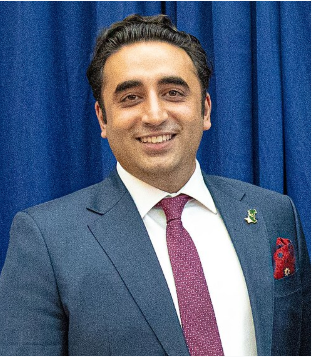In what appears to be a calculated diplomatic response, Pakistan’s Prime Minister Shehbaz Sharif has tasked former Foreign Minister Bilawal Bhutto-Zardari with presenting the country’s “case for peace” on global platforms. This development follows India’s recent diplomatic push, where it deployed seven Members of Parliament to lead delegations worldwide, reinforcing its zero-tolerance stance on terrorism—particularly after the Pahalgam terror attack, which triggered Operation Sindoor.
The development highlights Islamabad’s pivot from military confrontation to diplomatic engagement following the bruising four-day escalation (May 7–10) under Operation Sindoor, where Pakistan faced significant military and reputational setbacks. By deploying Bhutto—a well-known political figure with strong international connections—Pakistan aims to reshape its global image and counter India’s narrative on cross-border terrorism.
Why Bilawal Bhutto? Credibility and Political Strategy
A Trusted Face in International Diplomacy
Bilawal Bhutto-Zardari, the heir to Pakistan’s most influential political dynasty, carries substantial diplomatic weight. As a former foreign minister, he has cultivated relationships with Western powers, the United Nations, and Gulf states, making him an ideal envoy for Pakistan’s peace push. His involvement signals Islamabad’s desire to present a moderate, statesmanlike image amid growing scrutiny over its alleged ties to militant groups.
Source: CNN_New 18
Domestic Political Gains
Beyond diplomacy, Bhutto’s appointment serves key political objectives:
-
Revitalizing the Pakistan People’s Party (PPP): With general elections looming, this move positions Bhutto as a national leader, strengthening the PPP’s appeal.
-
Diverting Attention from Governance Failures: The Sharif government, grappling with economic turmoil and security lapses, benefits from a high-profile diplomatic initiative to shift public focus.
-
Unifying a Fractured Political Landscape: By involving Bhutto, the government projects a bipartisan approach to foreign policy, easing tensions with opposition parties.
In a post on X (formerly Twitter), Bhutto confirmed his new role:
“Earlier today, Prime Minister @CMShehbaz reached out, asking me to lead a delegation presenting Pakistan’s case for peace globally. I am honored to accept this responsibility and remain dedicated to serving Pakistan in these challenging times.”
For deeper insights into Pakistan’s political dynamics:
The Diplomatic Roadmap: Targeting the UN and OIC
Key Forums for Pakistan’s Peace Narrative
Sources indicate that Bhutto’s delegation will prioritize engagements with:
-
United Nations (UN): To highlight “rising tensions” in South Asia and seek international mediation.
-
Organisation of Islamic Cooperation (OIC): To rally Muslim-majority nations behind Pakistan’s stance on Kashmir and regional stability.
Expected Talking Points
-
Humanitarian Concerns: Emphasizing the impact of conflict on civilians in disputed regions.
-
Ceasefire Violations: Accusing India of aggression while downplaying Pakistan’s role in cross-border militancy.
-
Dialogue Over War: Advocating for peace talks to de-escalate India-Pakistan tensions.
However, skepticism persists, given Pakistan’s history of sponsoring proxy groups, as noted by the Financial Action Task Force (FATF), which kept Pakistan on its grey list for years due to terror financing concerns.
For background on Pakistan’s FATF challenges:
Challenges to Pakistan’s Peace Narrative
International Skepticism
Despite Bhutto’s diplomatic charm, major powers remain wary due to:
-
Evidence of Pakistan-based militants in attacks like Pahalgam.
-
Operation Sindoor’s Aftermath: The military operation exposed Pakistan’s limited operational readiness, undermining its deterrence claims.
-
Continued Support for Militant Proxies: Reports from UN monitoring groups and Indian intelligence suggest ongoing ties between Pakistan’s ISI and groups like Lashkar-e-Taiba (LeT).
India’s Counter-Narrative
New Delhi is likely to dismiss Pakistan’s peace overtures as insincere, citing:
-
Cross-Border Infiltration: Persistent attempts to push militants into Jammu & Kashmir.
-
Propaganda Warfare: Pakistan’s use of international forums to deflect blame rather than address terrorism.
For analysis on India-Pakistan tensions:
Domestic Implications: A Bid for Political Survival
Strengthening the PPP Ahead of Elections
Bhutto’s return to the diplomatic stage could re-energize the PPP’s base, positioning him as a future prime ministerial candidate. With the Pakistan Muslim League-Nawaz (PML-N) struggling with governance issues, the PPP sees an opportunity to regain relevance.
Public Perception: Peace Push or Distraction?
While some Pakistanis may welcome Bhutto’s diplomatic mission, critics argue it is a smokescreen to:
-
Mask Military Weaknesses exposed in Operation Sindoor.
-
Avoid Accountability for failed counterterrorism policies.
Conclusion: Will Pakistan’s Diplomacy Succeed?
Pakistan’s decision to deploy Bilawal Bhutto-Zardari on a global peace mission is a high-stakes gamble. While it may temporarily improve Islamabad’s image, lasting credibility depends on concrete actions:
- Cracking down on militant groups operating from its soil.
- Engaging in sincere dialogue with India without preconditions.
- Addressing international concerns on terror financing.
If Pakistan fails to deliver, Bhutto’s diplomatic tour risks being seen as mere theatrics—a temporary fix for deeper structural issues.
For real-time updates on South Asian geopolitics:

